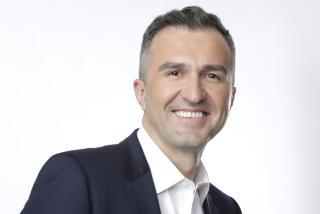Karmazin Joins Sirius Team as CEO
- Share via
One month after Sirius Satellite Radio Inc. stole Howard Stern from Viacom Inc.’s Infinity Broadcasting, the company said Thursday that it had hired the shock jock’s biggest ally, the former top media executive whom Stern has referred to on the air as simply “my Mel.”
Mel Karmazin, Viacom’s former president, is replacing consumer electronics veteran Joseph P. Clayton as chief executive of the nation’s second-ranked satellite radio provider. Clayton will remain Sirius’ chairman.
The move will reunite Stern with his former boss, who left Viacom in June after a power struggle with Sumner Redstone, the 81-year-old CEO of the nation’s third-largest entertainment giant.
It also puts Karmazin, a widely regarded radio executive, in direct competition with one of his former lieutenants, Leslie Moonves, who became co-president of Viacom after Karmazin’s departure. Moonves is now charged with turning around Infinity, the struggling radio group Karmazin built.
Karmazin, 61, proclaimed Thursday that satellite radio was the future. “Someday, every single car will be made with a satellite radio,” he said in an interview, pointing out that traditional radio faces a host of new high-tech competitors including the Internet and portable devices such as iPods.
During his time at Viacom’s helm, Karmazin had regularly dismissed the prospects of satellite radio. But on Thursday he said he had tailored his words at the time to try to downplay the threat the upstart technology posed to the nation’s second-largest radio station owner.
Today, Karmazin said, satellite radio is poised to “reshape the landscape” of the industry. He predicted that Sirius’ recent signings of Stern and the National Football League would put satellite radio on the map, just as channels ESPN and MTV fueled the subscription TV business in the early days of cable.
Karmazin’s appointment was announced after regular stock trading, but Sirius shares jumped after hours, gaining 88 cents to $5.60. In regular trading on Nasdaq, the shares had closed down 23 cents, at $4.72.
Karmazin countered industry speculation that he was the mastermind behind Sirius’ hiring of Stern, whose career he helped to nurture. “I was as surprised as anyone,” Karmazin said. “The first call I got from Sirius was after Howard signed his deal.”
Stern’s lucrative five-year agreement with Sirius is worth an estimated $500 million. But the radio star, whose top-rated program brings in an estimated $80 million annually, cannot jump to satellite until his contract with Infinity expires at the end of 2005.
In the meantime, Stern has been doing everything in his power to give Infinity reason to release him early. On the air, he has made a habit of badmouthing Infinity executives and lamenting that Karmazin is no longer at the helm.
“My Mel is gone,” he told his listeners recently. “It’s time for me to leave.”
Stern is also plugging satellite radio at every turn. He admitted on the “Late Show with David Letterman” on Thursday night that Viacom executives had ordered him to stop using their airwaves to promote Sirius. The show was taped before Karmazin’s announcement.
Stern’s relentless campaign has driven up Sirius’ stock value. Even though it has only 900,000 subscribers, the company is worth about $6 billion on Wall Street, nearly twice as much as it was at the beginning of the year.
Some 10,000 Stern fans showed up Thursday at a rally in New York’s Union Square, where the radio personality gave away 500 Sirius boomboxes and an additional 20,000 certificates for free radios. For $12.95 a month, Sirius subscribers receive 120 channels of mostly commercial-free music, sports, news, talk and traffic updates.
Having committed to Stern’s ultra-rich contract, Sirius needs to sign up 1 million new subscribers just to break even.
“What we need to do at Sirius is pile on subscribers and get the automakers to roll out more of our radios,” said Karmazin, predicting that improved programming would help accomplish that goal. He said he was also committed to driving down Sirius’ costs and generating additional revenue from advertising to make the money-losing company profitable.
Analysts said Karmazin could be the perfect choice because of his hard-charging, bottom-line-oriented style and talents as a super-salesman.
“I couldn’t think of anyone better,” said Larry Gerbrandt, head of the media and entertainment practice of AlixPartners, a Los Angeles consulting firm.
Sirius’ chief competitor, meanwhile, greeted Karmazin’s entry into the business with bemusement.
“It was only a short time ago that Mel dismissed the promise of satellite radio,” said Hugh Panero, chief of XM Satellite Radio Holdings Inc. “As the industry leader, with more than 2.5 million subscribers, we welcome him to the vision of satellite radio.”
The son of a New York taxi driver, Karmazin started his career as a radio ad salesman in 1967. He went on to build Infinity Broadcasting Corp. into one of the nation’s premier radio station owners with personalities such as Stern and Don Imus.
In 1996, he sold Infinity to Westinghouse Electric Corp., which later changed its name to CBS Inc. Karmazin ultimately became CEO of CBS and initiated the talks that led to Viacom’s $43.4-billion purchase of the company in 2000.
In the years right after the acquisition, Karmazin was a Wall Street darling because of his cost consciousness and obsession with keeping the stock price high. But many of Viacom’s creative executives were offended by his brusque style and lack of interest in their business, which he dismissed as “arts and crafts.”
Karmazin lost some luster among investors when Viacom’s stock began to slip over the last year as a result of the continued weakness of the company’s radio group. He promised a rebound, but it never came.
More to Read
The biggest entertainment stories
Get our big stories about Hollywood, film, television, music, arts, culture and more right in your inbox as soon as they publish.
You may occasionally receive promotional content from the Los Angeles Times.










